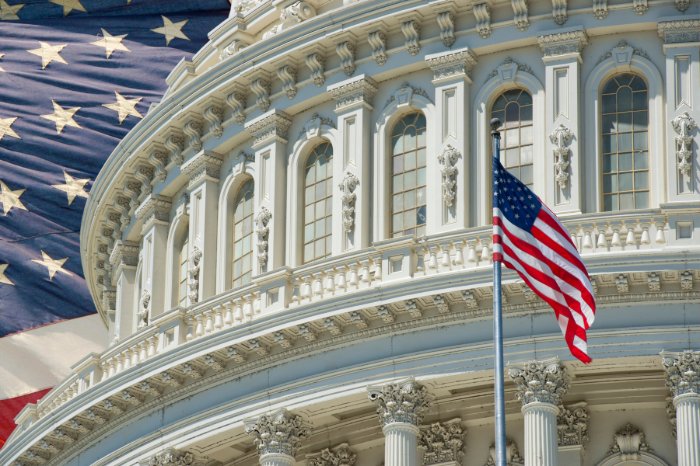Latest news from Washington, D.C. produced by Total Spectrum/SGA exclusively for members of the Arizona Chamber of Commerce & Industry
More Info: Michael DiMaria | Partner and Vice President of Business Development | 602-717-3891 | [email protected]

Heard on the Hill
Steve Gordon, Total Spectrum Managing Director
The Surprise that Really Wasn’t
Senator Joe Manchin said on yesterday’s Fox News Sunday hosted by Brett Baier that he couldn’t support President Biden’s Build Back Better Plan. You can watch the full interview here.
His announcement was a body blow to the President’s social infrastructure proposal, and probably was a mortal blow. But the bill’s momentum had already stalled. Most people heard air leaking out of the legislative balloon, and Senator Kyrsten Sinema (D-AZ) and Senator Joe Manchin (D-WV) held the pins.
Senator Sinema didn’t want to increase taxes on high earning individuals and corporations. Her objection became critical when the Congressional Budget Office ruled on November 18th that “this legislation would result in a net increase in the deficit totaling $367 billion over the period 2022 through 2031.”
Senator Manchin’s objections were mainly – but not exclusively – about the amount of spending in the bill and the impact of more spending on the economy in general and inflation specifically.
This Week has been watching Senator Manchin throughout 2021. We printed in our August 11th issue a quote from the Senator that described where he was on this issue.
“Over the past year, Congress has injected more than $5 trillion of stimulus into the American economy – more than any time since World War II – to respond to the pandemic. The challenge we now face is different: millions of jobs remain unfilled across the country and rising inflation rates are now an unavoidable tax on the wages and income of every American. These are not indications of an economy that requires trillions in additional spending. Every elected leader is chosen to make difficult decisions. Adding trillions of dollars more to nearly $29 trillion of national debt, without any consideration on the negative effects on our children and grandchildren, is one of those decisions that has become far too easy in Washington.”
I attended a dinner in late November for Senator Manchin that was hosted by our colleague Patrick Robertson. The Senator spent 2 1/2 hours discussing his objections to the amount of the spending in the bill, the impact that amount of spending would have on inflation, and the lack of transparency about the length and duration of the programs in the bill. He said more than once that he needs to explain his vote to his constituents in West Virginia, and it was clear that he was wrestling with priorities. He said he likes and respects the President, and that he can’t control when Majority Leader Schumer decides to bring up the bill for a vote, but that he will make a decision “…perhaps when I sit down in my chair on the Senate floor to vote.”
There are three observations that are worth repeating from past issues of This Week.
In the October 13th Heard on the Hill, I quoted Senator Roy Blunt (R-MO), Chair of the Republican Policy Committee. He told me that “there is a 20% chance that the wheels of the social infrastructure bill fall off the wagon.”
In the introduction to last week’s This Week, I quoted a Republican Senator who hit the nail on the head in his description of the problem faced by Senate Democrats. “Senator Manchin doesn’t want to support a bill that has a number of short-term programs that progressives intend to extend into long-term or permanent programs, and he wants to have the program paid for with a full decade of offsets. Senator Manchin also wants the bill paid for and Democrats can’t agree on which taxes to increase.”
There is a fascinating relationship between progressives and their agenda and the President and his agenda. As you will recall, candidate Joe Biden was not the progressive’s first choice, and he wasn’t even their second or third choice – until each progressive candidate stumbled and fell out of contention. Congressman James Clyburn (D-NC), Majority Whip of the House, endorsed Vice President Biden in the North Carolina primary and that was effectively the end of the primaries.
President Biden and his people apparently felt that governing to the right of his progressive base would ensure that that he would be a one term President. That’s exactly what happened to President Carter. Governing too moderately for the conservative base was also a significant factor in President George H.W. Bush’s 1992 loss.
In last week’s Washington Whispers, Patrick Robertson talked about President Biden, Senator Manchin, Democratic progressives, and their respective agendas. It’s worth another read.
“I hosted a dinner for Senator Manchin last week and he asked an important question: ‘Is Build Back Better really part of the Biden agenda or is it part of the progressive agenda in Congress?’ While the question is simple, the answer is complicated. The President would say yes, but Senator Manchin would say no. Progressives saved President Biden in the Democratic primary, so in a lot of ways they are one in the same. The pragmatic, compromise-driven Senator Joe Biden would have been closer to Senator Manchin than Senator Bernie Sanders (I-VT). President Biden, however, is still pushing for Build Back Better to pass.”
It’s hard to imagine how the President rebuilds Build Back Better, but we’ll watch and keep you advised.













Add comment